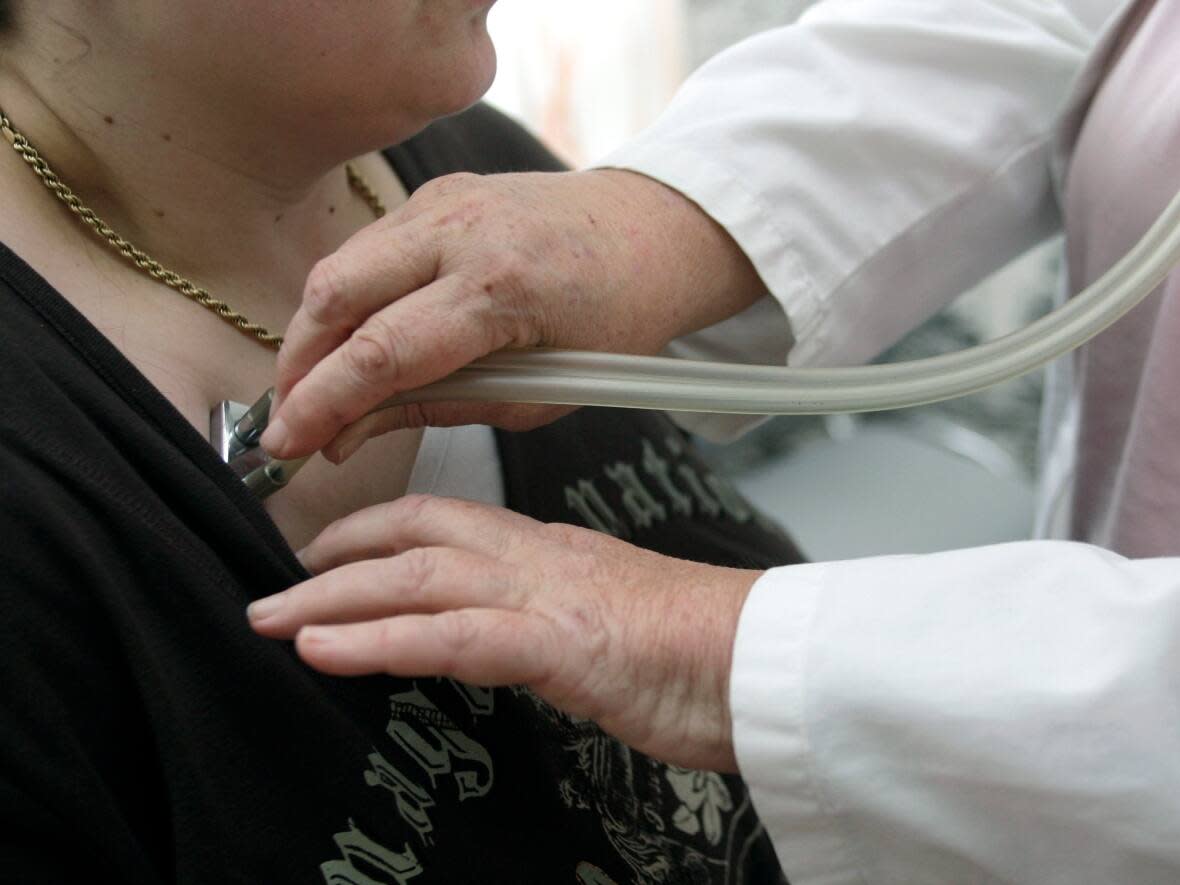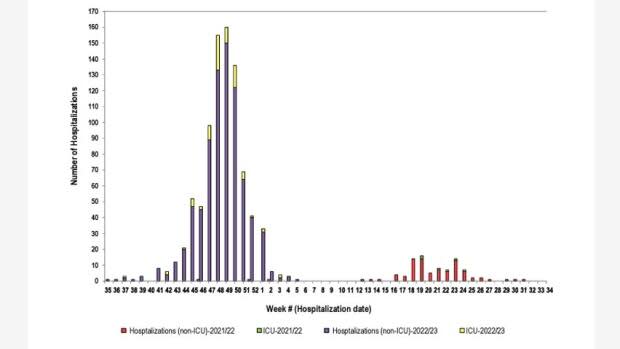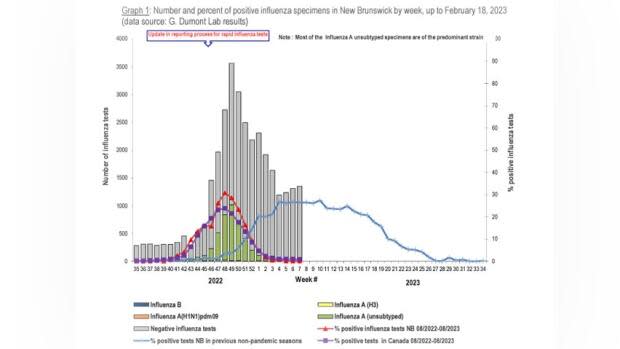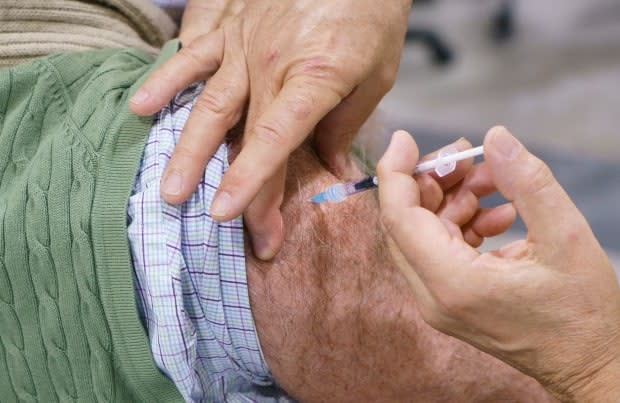Has N.B.'s deadliest flu season in a decade ended? Public Health continues to monitor

Flu activity in New Brunswick has dropped off to near zero in recent weeks, but whether this marks an early end to this "atypical" season, which "ramped up" early, remains unclear, according to health officials.
No flu deaths, flu hospitalizations or nursing home outbreaks were reported in the province between Feb. 12 and Feb. 18, and there was only one positive lab-confirmed case, according to the latest influenza report.
The previous week saw identical numbers.
By comparison, 10 deaths, 146 hospitalizations, 10 outbreaks and 1,016 new cases were reported the week ending Dec. 10.
It's a dramatic drop in what has been the deadliest influenza season in at least a decade — a season that has had health officials concerned about the added strain on the hospital system.

Public Health is "happy to see that influenza activity is currently low and stable," said Department of Health spokesperson Sean Hatchard.
"As we've seen in recent weeks, the number of influenza cases in both New Brunswick and across the country are on the decline," he said in an emailed statement.
At the national level, influenza activity "remains low at levels typically seen in late spring/early summer," the report notes.
Asked whether this could signal the end of the flu season in New Brunswick, Hatchard said the respiratory illness season typically starts "ramping up" in November and starts decreasing April.
"While this respiratory illness season has been atypical, we continue to monitor the situation closely," he said.

Dr. Yves Léger, the acting deputy chief medical officer of health, has previously said New Brunswick flu activity started earlier than the usual late-December or January.
"How this flu season will play out is still too early to tell, and we can't know exactly how the virus will behave this year," he told reporters in mid-November.
"We don't know if this flu season will be particularly worse than others, or whether or not we'll see more than one wave of activity due to an early start."
66 deaths so far
Sixty-six New Brunswickers have died from the flu since the season began on Aug. 28. Data on the Public Health website dating back to 2013-14 shows until now, the highest death toll was 50 during the 2017-18 season.
A total of 870 people have been hospitalized so far, and 4,308 cases have been confirmed by a lab, although the actual number of cases is likely much higher since most people don't get tested for the flu. They simply stay home.
The 2022-23 flu season continues into the summer.
'Sporadic' activity in Miramichi region
The Miramichi region, Zone 7, is currently the only health region with "sporadic" flu activity, according to the latest report.
Sporadic activity is defined as sporadically occurring influenza-like illnesses and lab-confirmed cases with no outbreaks detected within the region.
The six other regions are listed as having "no activity," which is defined as no laboratory-confirmed influenza detections in the reporting week, "however, sporadically occurring influenza-like illnesses may be reported."
Of the 4,308 cases confirmed to date, the Moncton region, Zone 1, saw the majority, with 1,239.
The regional breakdown of the other confirmed cases includes:
Saint John region, Zone 2 — 828.
Fredericton region, Zone 3 — 830.
Edmundston region, Zone 4 — 356.
Campbellton region, Zone 5 — 140.
Bathurst region, Zone 6 — 603.
Miramichi region, Zone 7 — 312.
Four influenza-like illness outbreaks in schools were reported during the latest reporting period — one in the Moncton region, two in the Saint John region and one in the Fredericton region.
But these outbreaks, which are based on absence rates of greater than 10 per cent because of influenza-like symptoms, should be interpreted with caution, the report notes. The number "might be misrepresented due to the ongoing circulation of COVID-19, since distinction between influenza-like-illness and COVID-like illness is not always evident."
The highest weekly number of school-related outbreaks so far this season was 63, during the week ending Dec. 3.
Flu shot encouraged
"The best way to reduce the risks associated with influenza is to get the flu shot and to practise healthy habits," Hatchard said.
The flu shot is recommended for all New Brunswickers aged six months and older, with a higher dose available for those 65 or older.
The seasonal influenza vaccine is available free of charge through a variety of immunization providers, including participating pharmacies and Public Health clinics.
Pneumonia vaccine encouraged for seniors
Earlier this week, the province announced New Brunswickers aged 65 and older can now book an appointment for their free pneumonia vaccine at participating pharmacies through the online provincial scheduler.
"People can also make an appointment through their primary care provider as well. But some may find it convenient to use the online scheduler," said Department of Health spokesperson Adam Bowie.
The online option comes after the National Advisory Committee on Immunization noted last week that the national uptake of pneumococcal vaccines among older adults and adults living with underlying medical conditions, both non-immunocompromising and immunocompromising, is "well below the target."
The goal of the national immunization strategy is to have 80 per cent of adults 65 and older vaccinated and to reduce the overall burden of disease by five per cent by 2025.
As it stands, only about 55 per cent of Canadian seniors report having received the vaccine, according to the advisory committee.
CBC has asked the Department of Health for the current and previous uptake statistics among New Brunswick seniors and is awaiting a response.

Last summer, Dr. Jennifer Russell told CBC she was concerned New Brunswickers were falling behind on their routine vaccinations. "It's been hard to keep up-to-date" during the COVID-19 pandemic, she said.
The pneumococcal polysaccharide 23-valent vaccine is among the routine vaccinations for adults 65 and older. Public Health recommends they receive one dose, regardless of risk factors or having received a previous pneumococcal vaccine.
It protects against 23 strains of streptococcus pneumoniae bacteria that can cause serious and life-threatening infections, such as pneumonia, ear infections, septicemia (an infection of the blood) and meningitis, according to the department's website.
Pneumococcal disease is "a significant risk to the population," Russell said during an interview Tuesday.
"There are a significant number of people in Canada each year that are affected by pneumococcal pneumonia, and it can be quite invasive and it can be quite severe."
The bacteria are spread through direct contact with respiratory secretions, such as saliva or mucus.
"This winter has brought with it many illnesses like flu and RSV as well as COVID-19," said Russell. "We remind New Brunswickers that vaccination remains the best way to prevent severe symptoms of COVID-19, influenza and pneumococcal disease."
New Brunswick also offers a pneumococcal conjugate vaccine as part of routine childhood vaccinations at the ages of two months, four months and 12 months.
More information about the vaccines is available online or by calling 1-833-437-1424. People with additional questions are encouraged to contact their primary care provider or pharmacist.


